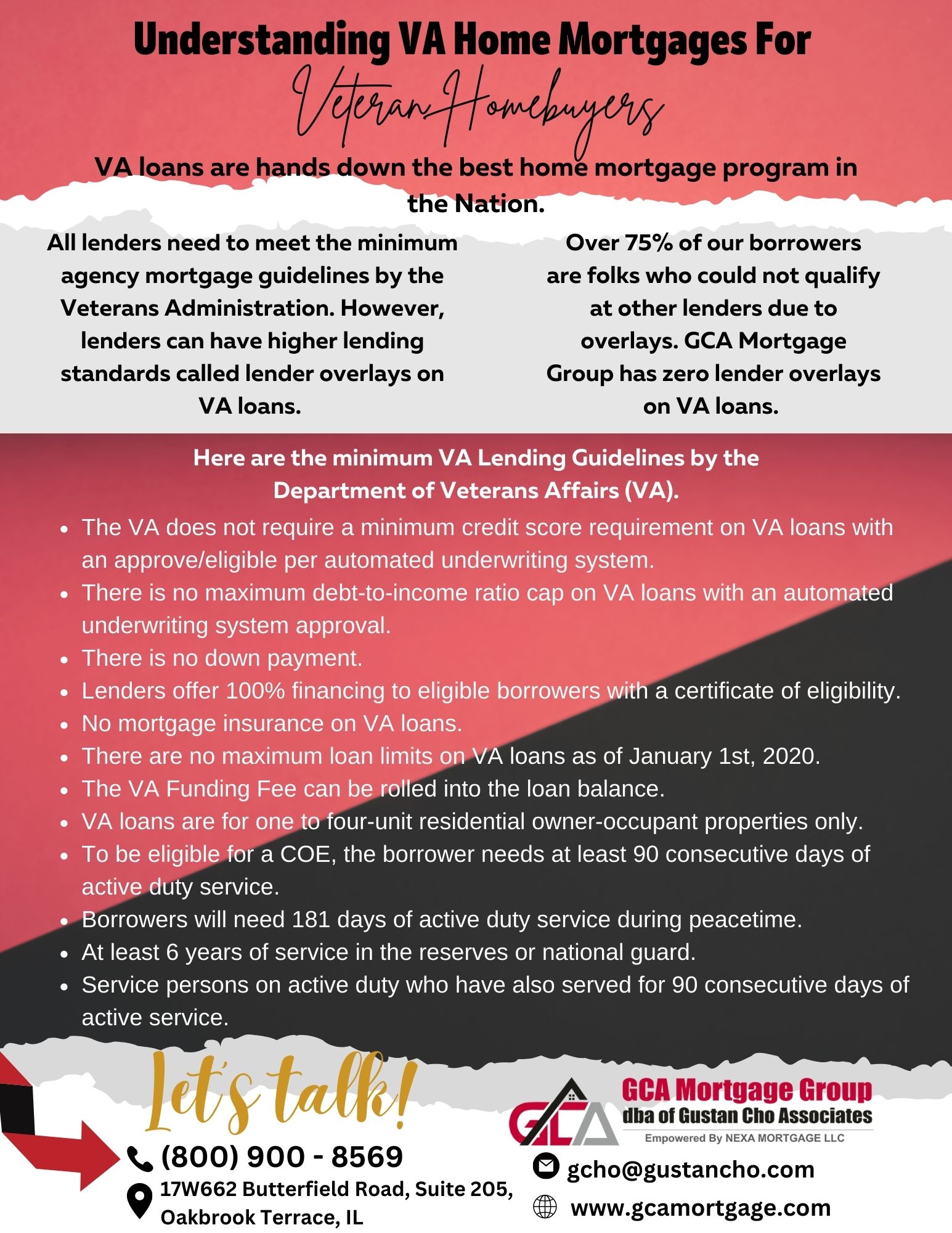Understanding VA Home Mortgages For Veteran Homebuyers
In this article, we will cover understanding VA home mortgages for veteran homebuyers. We will cover and discuss the eligibility requirements for active duty and retired veterans. Understanding VA Home Mortgages and the Agency Guidelines is very important because most lenders have lender overlays on VA loans.
What Are Lender Overlays on VA Loans?
Understanding VA home mortgages lender overlays is important. All lenders need to meet the minimum agency mortgage guidelines by the Veterans Administration. However, lenders can have higher lending standards called lender overlays on VA loans. Therefore, not all lenders have the same lending requirements on VA loans. This is why Understanding VA Home Mortgages and how overlays work is important. This holds especially true for borrowers with less-than-perfect credit or prior bad credit. Just because you do not qualify for a VA loan with one lender does not mean that you will not qualify with a different lender.
Confused About Lender Overlays on Your VA Loan?
Contact us today to learn how these additional requirements affect your eligibility and how we can help you get approved.
Best VA Mortgage Loans With No Lender Overlays
Gustan Cho Associates is a national mortgage company licensed in multiple states with no lender overlays on VA loans. Over 75% of our borrowers are folks who could not qualify at other lenders due to overlays. Gustan Cho Associates has zero lender overlays on VA loans. We just go off the automated underwriting system (AUS) findings and do not have another layer of lender overlays
Understanding VA Home Mortgages and About VA Loans
VA loans were created and put in place by Congress to reward the men and women of the United States Armed Service for their service in serving in our military. Active and retired members of the U.S. Military with a valid certificate of eligibility (COE) are eligible for a VA loan.

Understanding VA Home Mortgages: Top Benefits
The VA home loan program backed by the U.S. Department of Veterans Affairs offers the best mortgage benefits to those who served. Understanding VA home mortgages benefits is vital whether buying your first home, refinancing, or upgrading, VA loans are created to make homeownership more affordable and accessible for veterans and military families.
- No Down Payment Required
One of the biggest incentives of VA loans is you can buy a home with zero down. No need to save for a significant lump sum. You can keep your savings for emergencies, repairs, or furniture. - No Private Mortgage Insurance (PMI)
VA loans don’t require monthly mortgage insurance even with no down payment. This can save you hundreds each month. Lower monthly payments = higher home affordability. - Competitive Interest Rates
Compared to conventional loans, VA loans usually come with more competitive interest rates. Because the government guarantees the loan, lenders take on less risk. That means better rates for you potentially saving thousands over the life of your loan. - Flexible Credit Requirements
If you’ve had credit problems in the past, VA loans offer more lenient guidelines.. You may still qualify with lower credit scores, past bankruptcies, or foreclosures. There’s no minimum credit score set by the VA (but individual lenders may have overlays). - Limited Closing Costs
The VA limits the closing costs veterans can be charged. Some costs are not allowed to be paid by the borrower. Sellers can give up to 4% of the loan amount toward your closing costs or prepaid expenses. - Streamlined Refinance Options
Already have a VA loan? The VA IRRRL allows you to refinance without a new appraisal or full underwriting. Fast and easy refinance. Great way to lower your monthly payment or switch from ARM to fixed-rate loan. - Options for Renovation and Construction
VA loans can also be used for VA Renovation Loans. Finance both the home and repairs with one loan. And VA Construction Loans. Build a brand-new home with the same zero-down benefit. - Assumable Loans
VA loans are assumable, which means a approved buyer can take over your loan if you sell your home. When rates rise, this is a decisive advantage, making your home more attractive to buyers. - Multiple Uses Allowed
VA loans aren’t one-time-use only. You can use it again once your previous VA loan is paid off or entitlement is restored. Sometimes, you can even have two VA loans simultaneously (with partial entitlement). - Protection Against Foreclosure
The VA offers assistance and guidance to help veterans avoid foreclosure. They can work with your lender on your behalf. Additional tools are available for financial hardship situations.
How Do VA Loans Work?
VA loans are hands down the best home mortgage program in the Nation. The VA does not originate nor fund loans. Private lenders use their money and/or warehouse lines of credit to originate, process, underwrite, and fund VA loans.
In the event, the borrower defaults on their VA loan and goes into foreclosure, the VA will partially insure and guarantee the loss sustained by the lender.
Due to this government guarantee by the VA, lenders can offer VA home mortgages with a 100% down payment with no private mortgage insurance at competitively low rates.
VA Agency Mortgage Guidelines
As mentioned earlier, all lenders need to make sure their borrowers meet the VA Agency Mortgage Guidelines. Lenders can have higher standards that are above and beyond VA Agency Guidelines called lender overlays. Gustan Cho Associates is one of the very few national mortgage companies with no lender overlays.
Wondering How Lender Overlays Impact Your VA Loan?
Contact us today to understand how they work and how we can help you navigate through them.
VA Loan Requirements and Guidelines
Here are the minimum VA Lending Guidelines by the Department of Veterans Affairs (VA).
- The VA does not require a minimum credit score requirement on VA loans with an approve/eligible per automated underwriting system.
- There is no maximum debt-to-income ratio cap on VA loans with an automated underwriting system approval.
- There is no down payment.
- Lenders offer 100% financing to eligible borrowers with a certificate of eligibility.
- No mortgage insurance on VA loans.
- There are no maximum loan limits on VA loans as of January 1st, 2020.
- The VA Funding Fee can be rolled into the loan balance.
- VA loans are for one to four-unit residential owner-occupant properties only.
- To be eligible for a COE, the borrower needs at least 90 consecutive days of active duty service.
- Borrowers will need 181 days of active duty service during peacetime.
- At least 6 years of service in the reserves or national guard.
- Service persons on active duty who have also served for 90 consecutive days of active service.
The FUNDING FEE CHART from the VA explains how much eligible veterans need to pay.
Qualifying For a VA Home Mortgage After Bankruptcy And Foreclosure
Homebuyers can qualify for a VA home mortgage after bankruptcy, foreclosure, a deed in lieu of foreclosure, or a short sale. The waiting period after bankruptcy, foreclosure, a deed in lieu of foreclosure, or a short sale is two years. Established credit and no late payments after bankruptcy and/or housing event is frowned upon by lenders and is difficult to get approve/eligible per AUS.
VA Loans While In Chapter 13 Bankruptcy
Homebuyers in an active Chapter 13 repayment plan are eligible to qualify for VA loans with Trustee approval with a manual underwrite. Chapter 13 bankruptcy does not have to be discharged. There is no waiting period after the Chapter 13 Bankruptcy discharge date. However, if the Chapter 13 discharge date has not been seasoned for two years, the file is downgraded to a manual underwrite.
Frequently Asked Questions (FAQs)
1. What is a VA home mortgage?
Understanding VA home mortgages is essential. A VA home mortgage is a loan program the Department of Veterans Affairs provides to assist veterans, active-duty service members, and qualified surviving spouses in buying, building, or improving a home. These loans often come with good terms, such as no down fees and no private mortgage insurance.
2. Who is eligible for a VA home mortgage?
Eligibility for a VA home mortgage is typically extended to Veterans, Active-duty service members, Members of the National Guard or Reserves, and Eligible surviving spouses Eligibility is determined based on the length and type of service and discharge status.
3. What are the benefits of a VA home mortgage?
Key benefits of a VA home mortgage include:
1. No down payment is required in most cases
2. No private mortgage insurance (PMI) required
3. Competitive interest rates
4. Limited closing costs
5. Lenient credit requirements compared to conventional loans
6. The capacity to finance the VA funding fee
4. What is the VA funding fee?
VA funding fee is a single payment made to the Department of Veterans Affairs to cover the expenses of the VA loan program. The fee can be added to the loan total amount and varies based on factors such as the loan amount, type of loan, and whether the borrower has used a VA loan.
5. Can the VA funding fee be waived?
The VA funding fee can be exempted for certain veterans, particularly those receiving VA disability compensation. Surviving spouses of veterans who passed away in service or due to a service-related disability may also be eligible for a waiver.
6. What types of properties can be purchased with a VA home mortgage?
VA home loans can be utilized to buy:
1. Single-family homes
2. Condominiums and townhomes (VA-approved)
3. Manufactured homes and lots
4. Multi-family properties (up to four units) if the veteran wanted to occupy one of the units
5. New construction homes
7. Can I utilize a VA loan more than once?
Understanding VA home mortgages utilization is crucial. You can use a VA loan multiple times if you have remaining entitlement and meet the eligibility requirements. Your entitlement can be restored after paying off a previous VA loan or selling the property.
8. Understanding VA home mortgages: How do I apply?
Understanding VA home mortgages application is crucial. Here’s how:
1. Get a Certificate of Eligibility from the VA, verifying your loan Eligibility.
2. Choose a VA-approved lender and complete their loan application process.
3. Provide the lender with the necessary documentation, such as your COE, income verification, and credit information.
4. The lender will process your application and guide you through the steps to closing.
9. What credit score is needed for a VA home mortgage?
It does not set a minimum credit score needed, but most lenders prefer a credit score of at least 620. However, some lenders may accept lower scores based on other compensating factors.
10. How does the appraisal process work for a VA home mortgage?
Understanding VA home mortgages appraisal process is important. The VA requires an inspection to ensure the property meets minimum property requirements (MPRs) and is safe, structurally sound, and sanitary. A VA-approved appraiser will assess the property and provide a report to the lender. The appraisal helps identify the home’s fair market value and any necessary repairs.
How To Get Approved For The Best VA Mortgage Loans With No Overlays
If you’re still having a hard time understanding VA home mortgages or you’re a Homebuyer who need to qualify for a VA loan with a five-star national mortgage company licensed in multiple states with no lender overlays, please contact us at Gustan Cho Associates at 800-900-8569 or text us for a faster response. Or email us at gcho@gustancho.com. The team at Gustan Cho Associates is available 7 days a week, evenings, weekends, and holidays.
Have Questions About VA Loan Overlays?
Reach out now to get clarity on how overlays impact your VA loan and how we can help you get the financing you need.







